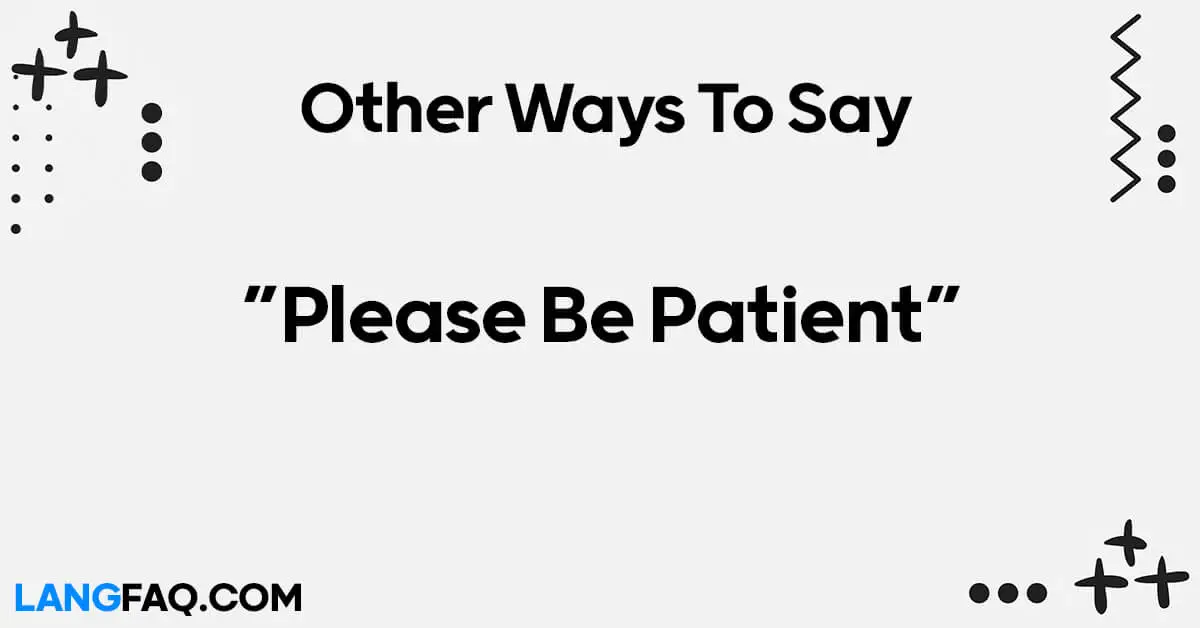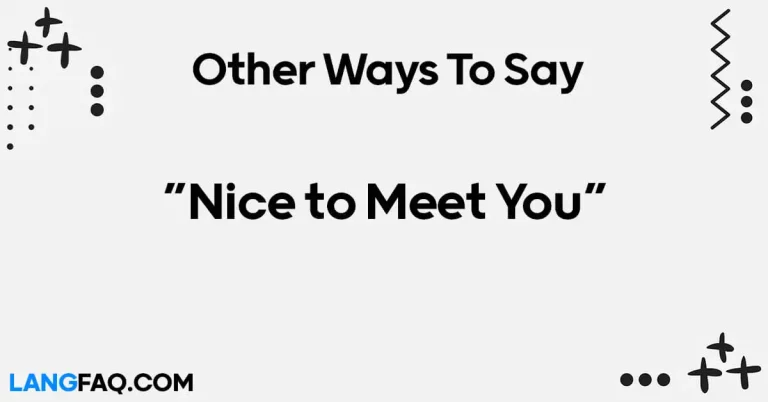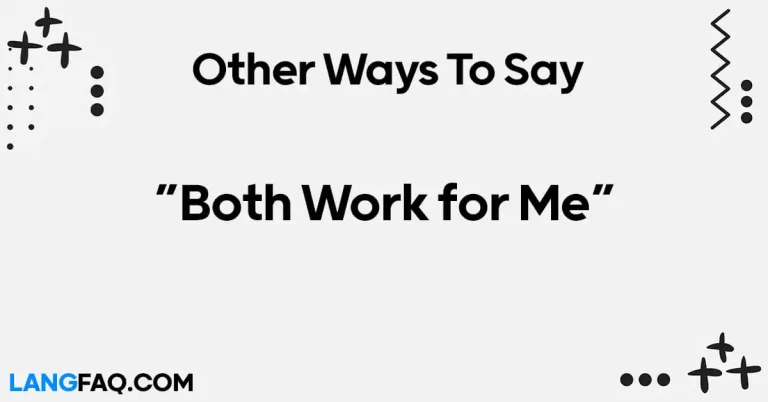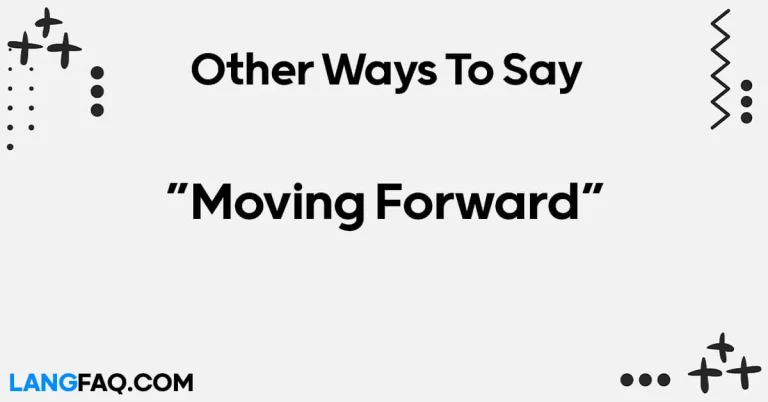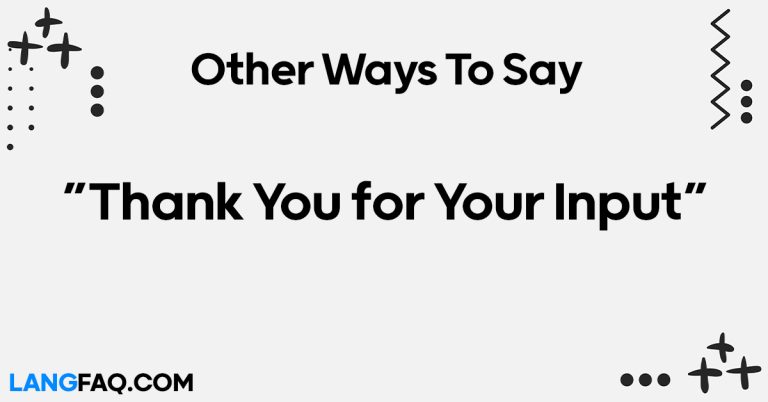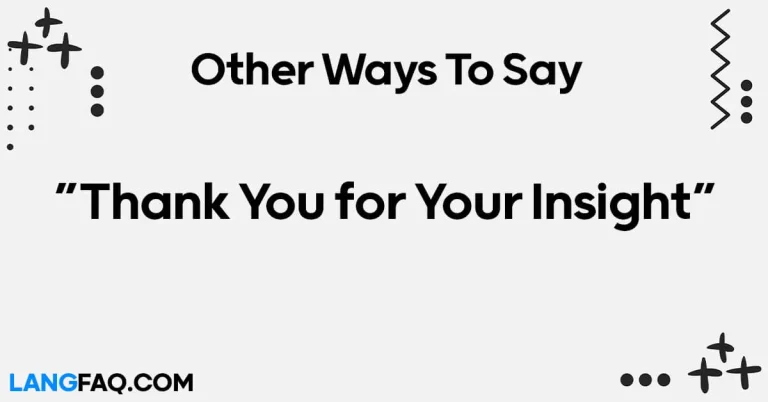Patience is a virtue, and effective communication plays a pivotal role in expressing it. In this comprehensive guide, we delve into 12 alternative ways to say “Please Be Patient,” offering insights, idioms, and strategies for different situations.
12 Other Ways to Say “Please Be Patient”
Here are 12 other ways to say “Please Be Patient”:
- Hold on a moment.
- Bear with me for a bit.
- Give me a second.
- I appreciate your patience.
- Just a little while longer.
- I need your understanding.
- Let me work through this.
- Stay with me for a moment.
- Your patience is valued.
- I’m asking for your understanding.
- Allow me some time.
- I’ll get back to you shortly.
Here’s a table with meanings and examples for the 12 other ways to say “Please Be Patient”:
| Expression | Meaning | Example |
|---|---|---|
| Hold on a moment | Asking someone to wait briefly | “Hold on a moment; I’ll find the information.” |
| Bear with me for a bit | Requesting patience for a short duration | “Bear with me for a bit; I’m finishing a task.” |
| Give me a second | Asking for a brief moment of time | “Give me a second; I need to answer this call.” |
| I appreciate your patience | Expressing gratitude for someone’s patience | “I appreciate your patience during this delay.” |
| Just a little while longer | Indicating a short additional waiting time | “Just a little while longer, and I’ll be ready.” |
| I need your understanding | Requesting empathy and patience | “I need your understanding while I explain.” |
| Let me work through this | Asking for time to handle a situation | “Let me work through this problem; I’ll update you soon.” |
| Stay with me for a moment | Requesting someone’s presence briefly | “Stay with me for a moment; I have news to share.” |
| Your patience is valued | Acknowledging and appreciating patience | “Your patience is valued in our customer service.” |
| I’m asking for your understanding | Seeking empathy and patience | “I’m asking for your understanding in this matter.” |
| Allow me some time | Requesting time to complete a task | “Allow me some time, and I’ll finish the report.” |
| I’ll get back to you shortly | Promising a prompt response | “I’ll get back to you shortly with the details.” |
In various situations, expressing the need for patience can be nuanced. These alternative phrases offer diverse ways to convey the same message, enhancing communication and fostering understanding in different contexts.
Is It Correct to Say “Please Be Patient”?
Certainly, “Please be patient” is a grammatically correct and commonly used phrase in English. It is a polite way to ask someone to wait calmly or endure a delay without becoming frustrated. This phrase is appropriate in various contexts, both formal and informal, and it is widely understood in everyday communication.
Examples:
- Formal Context: “Thank you for waiting. Please be patient as we address the technical issues.”
- Informal Context: “I’m finishing up a task; please be patient for a moment.”
Using this phrase is considerate and shows respect for the time and understanding of the person being addressed. It’s a straightforward and clear way to convey the need for patience in a given situation.
Professional Mail Example With “Please Be Patient”
Subject: Project Update – Brief Delay for Optimal Results
Dear [Recipient’s Name],
I trust this message finds you well. I wanted to provide you with a quick update on the ongoing project. We are currently in the final stages of review and refinement to ensure the highest quality outcomes.
However, we’ve encountered a slight delay due to unforeseen technical challenges. Rest assured, our team is actively addressing these issues to guarantee a seamless delivery.
Your understanding and cooperation during this time are invaluable to us. Please be patient for a little while longer, and we’ll ensure that the end results exceed expectations.
I appreciate your commitment to the success of this project and your patience as we work towards its completion. If you have any immediate concerns or questions, please feel free to reach out, and I’ll do my best to provide timely assistance.
Thank you for your understanding.
Best regards,
[Your Full Name] [Your Position] [Your Company]
Hold On a Moment: Embracing Brief Pauses
In the fast-paced world we navigate, the phrase “Hold on a moment” stands as a beacon for brief pauses. This expression gracefully requests patience without creating a sense of prolonged waiting. It is suitable for both formal and informal situations, making it a versatile choice.
When to Use:
- Formal Context: In a professional setting, if you’re addressing a colleague during a meeting and need a moment to gather your thoughts.
- Example Sentence: “Hold on a moment, John, let me check the latest figures before we proceed.”
- Informal Context: When talking to a friend on the phone and multitasking.
- Dialogue Snippet: “Hold on a moment, I just need to grab my keys before we head out.”
Variations:
- Colleagues: “Hold on a sec, I need to consult with my team.”
- Friends: “Hold on a minute, I’m sending a quick text.”
- Mentor-Mentee: “Hold on for a moment, let me provide some guidance.”
Email Sample:
Subject: Quick Pause for Clarification
Body: Hi [Recipient’s Name],
I hope this email finds you well. I wanted to discuss the upcoming project briefly. Hold on a moment; I’ll be right back with some key insights.
Best, [Your Name]
Bear With Me for a Bit: Seeking Patience with a Time Limit
“Bear with me for a bit” delicately communicates the need for patience while assuring the listener that the wait won’t be extended. This phrase is effective in scenarios where a short delay is anticipated.
When to Use:
- Formal Context: During a business presentation when encountering a technical glitch.
- Example Sentence: “Ladies and gentlemen, bear with me for a bit as we resolve this minor technical issue.”
- Informal Context: Explaining a minor delay to a friend while getting ready.
- Dialogue Snippet: “Bear with me for a bit; I just need to grab my jacket before we leave.”
Variations:
- Colleagues: “Bear with me for a moment; I’m finalizing the report.”
- Friends: “Bear with me for a sec; I’m just finishing a quick call.”
- Mentor-Mentee: “Bear with me for a bit; I’ll provide feedback shortly.”
Email Sample:
Subject: Brief Delay for Refinement
Body: Hello [Recipient’s Name],
I hope this message finds you in good spirits. I’m working on the final touches for our upcoming presentation. Bear with me for a bit, and I’ll ensure it’s polished to perfection.
Best regards, [Your Name]
Give Me a Second: Briefly Requesting Time
“Give me a second” is a concise way to request a short duration, making it ideal for situations where a quick interruption is needed. This phrase balances the urgency of the moment with the brevity of the delay.
When to Use:
- Formal Context: When answering a phone call during a meeting.
- Example Sentence: “Excuse me, give me a second; I need to take this call.”
- Informal Context: While cooking and responding to someone in the kitchen.
- Dialogue Snippet: “Give me a second; I’m just flipping the pancakes.”
Variations:
- Colleagues: “Give me a moment; I’ll double-check those figures.”
- Friends: “Give me a sec; I’m responding to a quick text.”
- Mentor-Mentee: “Give me a second; let me review your proposal.”
Email Sample:
Subject: Quick Interruption for Clarification
Body: Dear [Recipient’s Name],
I trust you’re well. Quick note – I’m reviewing the document you sent over. Give me a second to provide detailed feedback.
Best, [Your Name]
I Appreciate Your Patience: Expressing Gratitude with Professionalism
The phrase “I appreciate your patience” goes beyond a mere acknowledgment; it expresses genuine gratitude for the understanding and time extended. This formal expression is particularly effective in professional settings, adding a touch of courtesy to the request for patience.
When to Use:
- Formal Context: During a virtual meeting when technical difficulties cause a delay.
- Example Sentence: “I appreciate your patience as we work through these unexpected technical issues.”
- Informal Context: When a friend waits for you to arrive at a casual gathering.
- Dialogue Snippet: “I appreciate your patience; traffic was unexpectedly heavy.”
Variations:
- Colleagues: “I appreciate your patience in awaiting the finalized report.”
- Friends: “I appreciate your patience; I’m running a bit late.”
- Mentor-Mentee: “I appreciate your patience as I guide you through this process.”
Email Sample:
Subject: Gratitude for Your Patience
Body: Dear [Recipient’s Name],
Thank you for your patience during our recent team meeting. I appreciate your understanding as we addressed the technical challenges promptly.
Best regards, [Your Name]
Just a Little While Longer: Promising Imminent Resolution
This phrase, “Just a little while longer,” is a promise of imminent resolution, providing reassurance that the wait will be brief. It’s an optimistic way to acknowledge the delay while conveying a sense of urgency.
When to Use:
- Formal Context: In customer service, addressing a client waiting for assistance.
- Example Sentence: “Thank you for holding; just a little while longer, and I’ll have the information you need.”
- Informal Context: Waiting for a friend to finish a call before heading out.
- Dialogue Snippet: “Just a little while longer, and I’ll be ready to go.”
Variations:
- Colleagues: “Just a little while longer, and I’ll complete the final edits.”
- Friends: “Just a little while longer, and I’ll join you at the cafe.”
- Mentor-Mentee: “Just a little while longer, and I’ll review your project.”
Email Sample:
Subject: Brief Delay, But Almost There
Body: Hi [Recipient’s Name],
I hope this message finds you well. We’re experiencing a minor delay, but rest assured, just a little while longer, and I’ll have the necessary details for you.
Best, [Your Name]
I Need Your Understanding: Seeking Empathy in Communication
“I need your understanding” is a straightforward yet sincere way to communicate the need for patience. It goes beyond a simple request, fostering a sense of empathy in the listener. This phrase is versatile and can be used in various contexts.
When to Use:
- Formal Context: Discussing a project deadline extension with a team.
- Example Sentence: “I need your understanding as we navigate unexpected challenges in meeting the deadline.”
- Informal Context: Explaining a delay to a friend due to personal commitments.
- Dialogue Snippet: “I need your understanding; I have a family commitment that I can’t reschedule.”
Variations:
- Colleagues: “I need your understanding as we adjust our project timeline.”
- Friends: “I need your understanding; my schedule is a bit tight this week.”
- Mentor-Mentee: “I need your understanding as we refine your project goals.”
Email Sample:
Subject: Request for Understanding
Body: Dear [Recipient’s Name],
I hope this message finds you well. In light of recent developments, I need your understanding regarding a slight adjustment to our project timeline.
Thank you for your cooperation, [Your Name]
Let Me Work Through This: Seeking Concentrated Focus
“Let me work through this” conveys a sense of determination to resolve a situation. It’s an expression used when faced with a challenge or a complex task, signaling the need for undivided attention and concentration.
When to Use:
- Formal Context: During a project discussion when encountering a difficult problem.
- Example Sentence: “Let me work through this issue, and I’ll provide an update shortly.”
- Informal Context: Explaining a delay in plans to a friend due to unexpected circumstances.
- Dialogue Snippet: “Let me work through this family matter; I’ll get back to you as soon as I can.”
Variations:
- Colleagues: “Let me work through this report, and I’ll share the findings.”
- Friends: “Let me work through this personal matter; I appreciate your understanding.”
- Mentor-Mentee: “Let me work through this challenge together with you.”
Email Sample:
Subject: Temporary Delay for In-Depth Analysis
Body: Dear [Recipient’s Name],
I hope this message finds you in good spirits. I’m currently addressing a complex issue. Let me work through this, and I’ll update you with the solution shortly.
Thank you for your patience, [Your Name]
Stay With Me for a Moment: Requesting Presence
“Stay with me for a moment” is an invitation for someone’s presence. It is used when a brief but important exchange is expected, emphasizing the need for undivided attention during that short period.
When to Use:
- Formal Context: While discussing a critical point in a business presentation.
- Example Sentence: “Stay with me for a moment as we delve into the key insights of our proposal.”
- Informal Context: Asking a friend to remain attentive during a crucial part of a conversation.
- Dialogue Snippet: “Stay with me for a moment; I want to share something important.”
Variations:
- Colleagues: “Stay with me for a second; I need your input on this matter.”
- Friends: “Stay with me for a moment; this part of the story is fascinating.”
- Mentor-Mentee: “Stay with me for a bit; I’ll guide you through this concept.”
Email Sample:
Subject: Brief Moment Needed for Discussion
Body: Hello [Recipient’s Name],
I trust you’re doing well. I have a proposal to discuss. Stay with me for a moment, and we can go through the details together.
Best regards, [Your Name]
Your Patience Is Valued: Acknowledging and Appreciating
“Your patience is valued” not only acknowledges the act of waiting but also expresses gratitude. It is a formal and courteous way of recognizing the time and understanding extended by others.
When to Use:
- Formal Context: In a customer service email addressing a delayed response.
- Example Sentence: “Your patience is valued, and we apologize for any inconvenience caused by the delay in our response.”
- Informal Context: Thanking a friend for waiting during unforeseen circumstances.
- Dialogue Snippet: “Your patience is valued; I appreciate you waiting for me.”
Variations:
- Colleagues: “Colleagues: Your patience is valued as we refine our project goals.”
- Friends: “Friends: Your patience is valued; I’ll catch up with you shortly.”
- Mentor-Mentee: “Mentor-Mentee: Your patience is valued during the learning process.”
Email Sample:
Subject: Appreciation for Your Patience
Body: Dear [Recipient’s Name],
We want to express our sincere gratitude. Your patience is valued as we work diligently to resolve the matter. Thank you for your understanding.
Best regards, [Your Name]
I’m Asking for Your Understanding: Seeking Empathy and Cooperation
“I’m asking for your understanding” is a direct and sincere way to seek empathy and cooperation. This phrase conveys a sense of openness and vulnerability, emphasizing the importance of the listener’s understanding in a given situation.
When to Use:
- Formal Context: Requesting understanding from colleagues in a team meeting.
- Example Sentence: “I’m asking for your understanding as we navigate these challenging circumstances together.”
- Informal Context: Explaining a personal situation to a friend.
- Dialogue Snippet: “I’m asking for your understanding; this week has been particularly challenging for me.”
Variations:
- Colleagues: “Colleagues, I’m asking for your understanding as we adjust our project timeline.”
- Friends: “Friends, I’m asking for your understanding; I might need some extra support right now.”
- Mentor-Mentee: “Mentor-Mentee, I’m asking for your understanding as we address this learning curve.”
Email Sample:
Subject: Seeking Your Understanding
Body: Dear [Recipient’s Name],
I hope this email finds you well. In light of recent developments, I’m asking for your understanding regarding a slight adjustment to our project timeline.
Thank you for your cooperation, [Your Name]
Allow Me Some Time: Requesting Time for Concentrated Effort
“Allow me some time” is a polite yet assertive way of requesting a duration for concentrated effort. It’s an effective phrase to use when a task requires focused attention, and the speaker wants to ensure they can deliver the best results.
When to Use:
- Formal Context: During a project discussion when additional time is needed for research.
- Example Sentence: “Allow me some time to conduct thorough research before finalizing our proposal.”
- Informal Context: When a friend asks for immediate assistance, but you need time.
- Dialogue Snippet: “I appreciate your urgency, but please allow me some time to gather the information.”
Variations:
- Colleagues: “Colleagues, allow me some time to review the data for accurate insights.”
- Friends: “Friends, allow me some time to process this; I’ll get back to you shortly.”
- Mentor-Mentee: “Mentor-Mentee, allow me some time to provide comprehensive feedback on your work.”
Email Sample:
Subject: Request for Time to Ensure Accuracy
Body: Hello [Recipient’s Name],
I trust this message finds you well. I’m currently working on the requested report. Allow me some time to ensure accuracy and provide you with a thorough analysis.
Best, [Your Name]
I’ll Get Back to You Shortly: Promising Timely Follow-up
“I’ll get back to you shortly” is a commitment to provide a timely response or update. This phrase instills confidence in the listener that their inquiry or request will be addressed promptly.
When to Use:
- Formal Context: During a business meeting when a question requires further research.
- Example Sentence: “Thank you for your question; I’ll get back to you shortly with the necessary information.”
- Informal Context: When a friend asks for advice, and you need time to reflect.
- Dialogue Snippet: “I appreciate your trust; I’ll get back to you shortly with some insights.”
Variations:
- Colleagues: “Colleagues, I’ll get back to you shortly after consulting with the team.”
- Friends: “Friends, I’ll get back to you shortly with my thoughts on the matter.”
- Mentor-Mentee: “Mentor-Mentee, I’ll get back to you shortly after reviewing your proposal.”
Email Sample:
Subject: Timely Follow-up on Your Inquiry
Body: Dear [Recipient’s Name],
Thank you for reaching out. I’ll get back to you shortly with the information you requested. Your patience is appreciated.
Best regards, [Your Name]
Conclusion:
Patience is a universal virtue that can be expressed in various ways. By exploring these 12 alternatives to “Please Be Patient,” you enrich your communication toolkit, fostering better understanding and connection in every interaction.
FAQs:
Q: Can I use these phrases in professional emails? Absolutely! Incorporating these phrases in professional communication adds a touch of diplomacy and professionalism, making your requests more effective.
Q: Are there cultural differences in expressing patience? Yes, cultural nuances influence how patience is expressed. Understanding these differences enhances cross-cultural communication.
Q: How can I teach patience to my children? Teaching patience to children involves setting clear expectations, modeling patience, and using age-appropriate strategies to reinforce the concept.
Q: Do mindfulness techniques really help in cultivating patience? Yes, mindfulness techniques, such as deep breathing and meditation, can significantly contribute to cultivating patience by promoting a calm and centered mindset.
Q: Can expressing patience improve relationships? Absolutely! Patience is a key ingredient for healthy relationships, fostering understanding, empathy, and better communication.
Q: What are some common idioms related to patience? “Good things come to those who wait” and “Patience is a virtue” are two common idioms that convey the importance of patience.

